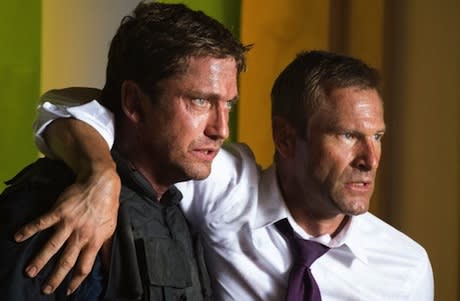Olympus Has Fallen must've been a no-brainer for FilmDistrict, the U.S. distributor that brought such fare as Gerard Butler's Playing for Keeps and the unnecessary Red Dawn remake to screens last year. (Or, for Canadian filmgoers, VVS.)
With star/executive producer Butler once again on board, a new batch of North Korean villains (this time presumably not a post-production decision aimed to prevent box office fallout in China) and a decidedly familiar premise, this medley of a movie looks to be their great white hope. (And the first of two wannabe Die-Hard-in-the-White-House theatrical releases scheduled for 2013.)
A shoddy, derivative and heavy-handed action-adventure thriller, Olympus Has Fallen follows Mike Banning (Butler), a dishonoured former member of the President's security detail, as he single-handedly battles the terrorist forces that have taken over 1600 Pennsylvania Avenue and kidnapped the Commander-in-Chief.
It's like the screenwriters thought, "If we're going to heavily reference a commercially and critically successful movie, why not just copy it?" deluding themselves into believing that, by parroting specific scenes, sequences and exchanges from Die Hard, they were crafting a tongue-in-cheek genre piece that would prove irresistible. Unfortunately, it isn't. Considering its source material, Olympus Has Fallen isn't even that much fun.
The action and plot points recall Die Hard — there's even a scene where a member of the extremist group pretends to be an ally when he encounters the hero — yet that film's tension, wit and heart are absent in this predictable shoot-'em-up fest.
Mike Banning is no John McClane (and the game Butler is no Bruce Willis). Both characters share an instinctive urge to serve-and-protect, and an ability to disregard their mortality, but while McClane's actions are apolitically motivated and resigned, Banning's appear jingoistic and uncomfortably ardent. In fact, the movie's patriotism is so overblown (a drinking game suggestion: take a swig every time the American flag is shown; two if it's riddled with bullet holes) as to be farcical.
As an audience, we root for McClane to prosper. Yes, it's almost impossible for thinking, sceptical viewers not to want the good guys to win and the bad guys to lose, but our investment in the 1988 holiday classic stems from the very human story at its core. Despite all its thrills and the unbeatable "yippee-ki-yay," there are emotional underpinnings and a personal narrative to help us root for the sardonic cop at Die Hard's helm.
In Olympus has Fallen, the emotional groundwork — Banning's role in the inadvertent death of the president's wife, which is treated with leaden seriousness — surrounds the protagonist's guilt over having failed at his job and his self-pity at being stuck behind a desk. Sure, he wants to save the nation and the President from the terrorists, but the subconscious motivation behind his one-man offensive isn't selfless, it's self-serving: Banning wants to prove himself capable, redeeming his ego, masculinity and livelihood in the process.
His heroism isn't altruistic, a moral victory or motivated by love; it's an act of exculpation.
(VVS Films)With star/executive producer Butler once again on board, a new batch of North Korean villains (this time presumably not a post-production decision aimed to prevent box office fallout in China) and a decidedly familiar premise, this medley of a movie looks to be their great white hope. (And the first of two wannabe Die-Hard-in-the-White-House theatrical releases scheduled for 2013.)
A shoddy, derivative and heavy-handed action-adventure thriller, Olympus Has Fallen follows Mike Banning (Butler), a dishonoured former member of the President's security detail, as he single-handedly battles the terrorist forces that have taken over 1600 Pennsylvania Avenue and kidnapped the Commander-in-Chief.
It's like the screenwriters thought, "If we're going to heavily reference a commercially and critically successful movie, why not just copy it?" deluding themselves into believing that, by parroting specific scenes, sequences and exchanges from Die Hard, they were crafting a tongue-in-cheek genre piece that would prove irresistible. Unfortunately, it isn't. Considering its source material, Olympus Has Fallen isn't even that much fun.
The action and plot points recall Die Hard — there's even a scene where a member of the extremist group pretends to be an ally when he encounters the hero — yet that film's tension, wit and heart are absent in this predictable shoot-'em-up fest.
Mike Banning is no John McClane (and the game Butler is no Bruce Willis). Both characters share an instinctive urge to serve-and-protect, and an ability to disregard their mortality, but while McClane's actions are apolitically motivated and resigned, Banning's appear jingoistic and uncomfortably ardent. In fact, the movie's patriotism is so overblown (a drinking game suggestion: take a swig every time the American flag is shown; two if it's riddled with bullet holes) as to be farcical.
As an audience, we root for McClane to prosper. Yes, it's almost impossible for thinking, sceptical viewers not to want the good guys to win and the bad guys to lose, but our investment in the 1988 holiday classic stems from the very human story at its core. Despite all its thrills and the unbeatable "yippee-ki-yay," there are emotional underpinnings and a personal narrative to help us root for the sardonic cop at Die Hard's helm.
In Olympus has Fallen, the emotional groundwork — Banning's role in the inadvertent death of the president's wife, which is treated with leaden seriousness — surrounds the protagonist's guilt over having failed at his job and his self-pity at being stuck behind a desk. Sure, he wants to save the nation and the President from the terrorists, but the subconscious motivation behind his one-man offensive isn't selfless, it's self-serving: Banning wants to prove himself capable, redeeming his ego, masculinity and livelihood in the process.
His heroism isn't altruistic, a moral victory or motivated by love; it's an act of exculpation.
